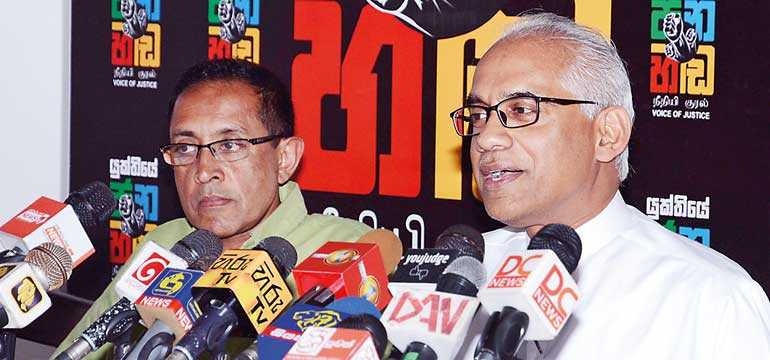Monday Feb 23, 2026
Monday Feb 23, 2026
Thursday, 8 November 2018 00:51 - - {{hitsCtrl.values.hits}}

UNP General Secretary Kabir Hashim (left) and UNP MP Eran Wickramaratne
- Pic by Pradeep Pathirana
The economic impact of the dragging Constitutional crisis could potentially hamper Sri Lanka’s debt refinancing efforts in 2019, and delay critical development projects, warned United National Party (UNP) General Secretary Kabir Hashim and UNP MP Eran Wickramaratne yesterday.
The duo speaking to reporters at Temple Trees insisted that the removal of Prime Minister Ranil Wickremesinghe and proroguing of Parliament by President Maithripala Sirisena was unconstitutional, and renewed calls to reconvene Parliament as early as possible. Hashim heavily criticised Prime Minister Mahinda Rajapaksa loyalists who had earlier censured the UNP for allowing the rupee to depreciate but had failed to arrest its decline since 26 October.
“These are the same people who went around saying that if they were in power, they would stop the rupee depreciation in hours.
Where are these people now? What are they doing? When they are in the Opposition they are full of promises, but when they are in power they do nothing. The Central Bank has had to spend $100 million since 26 October to defend the currency, and this is likely to increase unless Parliament is convened and this issue resolved,” he said.
Hashim also said that an estimated Rs. 7 billion in foreign investments had flowed out of the Government securities market as a result of the constitutional standoff, which is now over a week old. He insisted that this was a larger outflow than the amount from January to September 2018, and expressed fears that the outflow would worsen if political uncertainty continues.
Quoting from Moody’s statement last week, that detailed Sri Lanka’s heightened risk for debt refinancing due to the prevailing political uncertainty, he pointed out that an increase in interest rates would make borrowing more expensive for Sri Lanka. From 2019, Sri Lanka has to repay an estimated $12 billion as debt repayments till 2022, most of which need to be raised from international capital markets that decide interest rates based on macroeconomic fundamentals of a country.
“The agreement for the third phase of the Kandy highway was to be signed this week, but now that has been put on hold. The JICA loan for $1.4 billion for the Light Railway has been suspended. We had obtained funding for the new Kelaniya bridge project and were told that the next tranche would be delayed. These issues are impacting the development of the country. Who will take responsibility for these consequences?”
Hashim also mentioned the $460 million Millennium Challenge Cooperation grant that may be reversed unless Sri Lanka upholds democratic principles. MCC was earmarked primarily for infrastructure-related development efforts. The UNP MPs were adamant that under the post-2015 administration significant infrastructure developments had been made, and these were in danger of being derailed by the change of Prime Minister.
“Why are they so scared to show a majority in parliament? Members of Parliament are not children. They are intelligent enough to make up their own minds. We say with responsibility that we still hold a majority. They are spreading rumours of dissolution of Parliament to scare MPs into joining them,” Wickramaratne said.